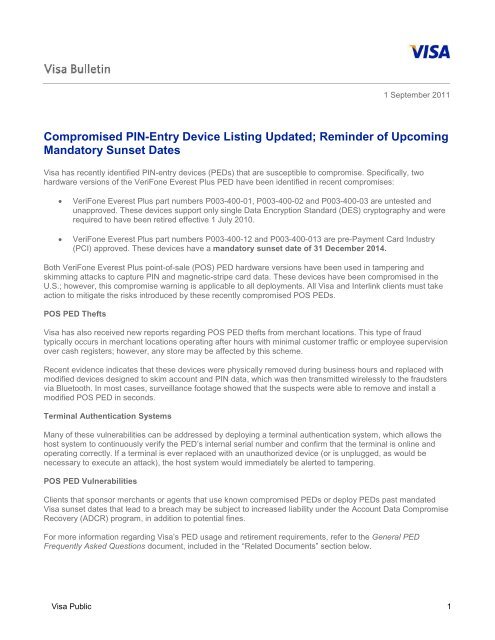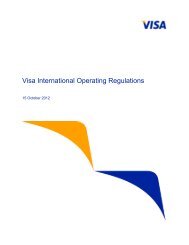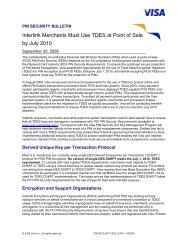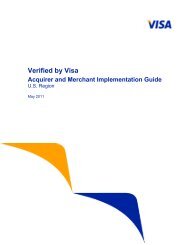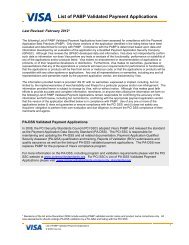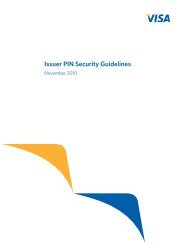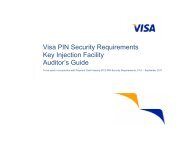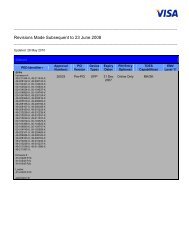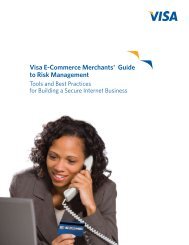Compromised PIN-Entry Device Listing Updated; Reminder of ... - Visa
Compromised PIN-Entry Device Listing Updated; Reminder of ... - Visa
Compromised PIN-Entry Device Listing Updated; Reminder of ... - Visa
You also want an ePaper? Increase the reach of your titles
YUMPU automatically turns print PDFs into web optimized ePapers that Google loves.
1 September 2011<br />
<strong>Compromised</strong> <strong>PIN</strong>-<strong>Entry</strong> <strong>Device</strong> <strong>Listing</strong> <strong>Updated</strong>; <strong>Reminder</strong> <strong>of</strong> Upcoming<br />
Mandatory Sunset Dates<br />
<strong>Visa</strong> has recently identified <strong>PIN</strong>-entry devices (PEDs) that are susceptible to compromise. Specifically, two<br />
hardware versions <strong>of</strong> the VeriFone Everest Plus PED have been identified in recent compromises:<br />
� VeriFone Everest Plus part numbers P003-400-01, P003-400-02 and P003-400-03 are untested and<br />
unapproved. These devices support only single Data Encryption Standard (DES) cryptography and were<br />
required to have been retired effective 1 July 2010.<br />
� VeriFone Everest Plus part numbers P003-400-12 and P003-400-013 are pre-Payment Card Industry<br />
(PCI) approved. These devices have a mandatory sunset date <strong>of</strong> 31 December 2014.<br />
Both VeriFone Everest Plus point-<strong>of</strong>-sale (POS) PED hardware versions have been used in tampering and<br />
skimming attacks to capture <strong>PIN</strong> and magnetic-stripe card data. These devices have been compromised in the<br />
U.S.; however, this compromise warning is applicable to all deployments. All <strong>Visa</strong> and Interlink clients must take<br />
action to mitigate the risks introduced by these recently compromised POS PEDs.<br />
POS PED Thefts<br />
<strong>Visa</strong> has also received new reports regarding POS PED thefts from merchant locations. This type <strong>of</strong> fraud<br />
typically occurs in merchant locations operating after hours with minimal customer traffic or employee supervision<br />
over cash registers; however, any store may be affected by this scheme.<br />
Recent evidence indicates that these devices were physically removed during business hours and replaced with<br />
modified devices designed to skim account and <strong>PIN</strong> data, which was then transmitted wirelessly to the fraudsters<br />
via Bluetooth. In most cases, surveillance footage showed that the suspects were able to remove and install a<br />
modified POS PED in seconds.<br />
Terminal Authentication Systems<br />
Many <strong>of</strong> these vulnerabilities can be addressed by deploying a terminal authentication system, which allows the<br />
host system to continuously verify the PED’s internal serial number and confirm that the terminal is online and<br />
operating correctly. If a terminal is ever replaced with an unauthorized device (or is unplugged, as would be<br />
necessary to execute an attack), the host system would immediately be alerted to tampering.<br />
POS PED Vulnerabilities<br />
Clients that sponsor merchants or agents that use known compromised PEDs or deploy PEDs past mandated<br />
<strong>Visa</strong> sunset dates that lead to a breach may be subject to increased liability under the Account Data Compromise<br />
Recovery (ADCR) program, in addition to potential fines.<br />
For more information regarding <strong>Visa</strong>’s PED usage and retirement requirements, refer to the General PED<br />
Frequently Asked Questions document, included in the “Related Documents” section below.<br />
<strong>Visa</strong> Public 1
The table below lists known compromised POS PED makes and models.<br />
Attended POS PED Category <strong>Compromised</strong> PED Description<br />
Untested / Unapproved POS PEDs—<strong>Device</strong>s deployed<br />
before <strong>Visa</strong> and the PCI Security Standards Council<br />
(SSC) implemented a PED testing program.<br />
These devices have been targeted by criminals and are<br />
known to have been compromised. <strong>Visa</strong> previously<br />
identified and published these compromised POS PEDs<br />
in editions <strong>of</strong> the <strong>Visa</strong> Business News and the <strong>Visa</strong><br />
Business Review, and in security alerts published at<br />
www.visa.com/cisp.<br />
Note: In 2003, <strong>Visa</strong> announced that all untested and<br />
unapproved attended POS PEDs must be removed from<br />
production by 1 July 2010. Clients may be liable under<br />
the ADCR program, and may be fined, if merchants are<br />
found using these PEDs.<br />
Pre-PCI Approved POS PEDs—<strong>Device</strong>s validated as<br />
compliant via lab testing and approved by <strong>Visa</strong> under pre-<br />
PCI requirements (listed at www.visa.com/cisp).<br />
Approval for the new deployment <strong>of</strong> POS PEDs listed in<br />
this category expired on 31 December 2007. These<br />
devices are actively targeted by criminals for<br />
compromise; clients are encouraged to retire these<br />
devices immediately.<br />
Note: In May 2010, <strong>Visa</strong> announced a mandatory sunset<br />
date <strong>of</strong> 31 December 2014 for all pre-PCI approved<br />
attended POS PEDs; however, the POS PEDs listed here<br />
should be replaced as soon as possible.<br />
PCI-Approved POS PEDs—<strong>Device</strong>s validated as<br />
compliant via lab testing according to PCI requirements<br />
(i.e., Version 1.x or higher) and approved by the PCI<br />
SSC.<br />
In May 2010, <strong>Visa</strong> announced that the Ingenico<br />
i3070MP01 and i3070EP01 devices were compromised.<br />
As a precaution (and to prevent further deployments), the<br />
PCI SSC, in coordination with Ingenico, revoked the<br />
approval <strong>of</strong> these devices.<br />
The Ingenico i3070MP01 and i3070EP01 devices are no<br />
longer approved PED terminals; both have been removed<br />
from the List <strong>of</strong> Approved <strong>PIN</strong> Transaction Security<br />
<strong>Device</strong>s.<br />
� VeriFone <strong>PIN</strong>pad 101, 201 and 2000<br />
� VeriFone Everest Model P003-3xx<br />
� VeriFone Everest Plus part numbers<br />
P003-400-01, P003-400-02 and<br />
P003-400-03<br />
� Hypercom S7S and S8<br />
� Ingenico eN-Crypt 2400 (also known<br />
as the C2000 Protégé)<br />
� Ingenico eN-Crypt 2100<br />
� VeriFone Everest Plus part numbers<br />
P003-400-12 and P003-400-013<br />
� Ingenico i3070MP01<br />
� Ingenico i3070EP01<br />
1 Mandatory sunset date for all PEDs in this category (includes both known compromised PEDs and non-compromised PEDs).<br />
2 <strong>Visa</strong> will evaluate appropriate sunset dates for expired PCI-approved POS PEDs.<br />
Recommended Mitigation Strategies<br />
Mandatory PED<br />
Sunset Date<br />
1 July 2010 1<br />
31 December 2014 1<br />
<strong>Visa</strong> strongly recommends that merchants be vigilant and maintain a secure store environment at all times,<br />
especially around cash registers and POS PEDs. To encourage such vigilance, the PCI SSC has published<br />
skimming prevention best practices that include:<br />
<strong>Visa</strong> Public 2<br />
TBD 2
� Visually inspecting terminals on a regular basis to identify anything abnormal, such as missing or altered<br />
seals or screws, extraneous wiring, holes in the device, or the addition <strong>of</strong> labels or other materials that<br />
could be used to mask damage from device tampering.<br />
� Physically securing terminals and <strong>PIN</strong> pads to counters to prevent removal; physically securing all cable<br />
connections.<br />
� Physically securing (under lock and key) stored terminals awaiting deployment; periodically validating the<br />
inventory on hand against asset records.<br />
� Using terminal asset tracking procedures for devices that are deployed, devices that are awaiting<br />
deployment, devices that are being repaired and devices that are in transit.<br />
� Validating the identity <strong>of</strong> repair technicians. Unauthorized or unexpected service personnel should be<br />
denied access; authorized and validated repair technicians should be escorted and monitored.<br />
� Periodically weighing the equipment and comparing it with vendors’ specification weights to identify the<br />
possible insertion <strong>of</strong> bugging devices.<br />
� Periodically scanning for any unidentified Bluetooth signals and pairings at store locations.<br />
<strong>Visa</strong> and Interlink acquirers should encourage merchants and agents that have deployed compromised POS<br />
PEDs to consider following these best practices to help defend against skimming attacks. For more information,<br />
refer to the POS Terminal Tampering Is a Crime…and You Can Stop It document, included in the “Related<br />
Documents” section below.<br />
Merchants should educate their employees on the potential for <strong>PIN</strong> compromise and ensure that staff members<br />
know what actions to take if a POS PED is stolen, missing or has noticeable signs <strong>of</strong> tampering.<br />
Merchants are also advised to inspect POS PED inventories regularly. If POS PED tampering is suspected,<br />
merchants should immediately contact their bank, <strong>Visa</strong> and law enforcement. Clients should also refer to the<br />
What to Do If <strong>Compromised</strong> document, included in the “Related Documents” section below.<br />
PED Procurement, Replacement and Retirement Planning<br />
As entities make plans for POS system upgrades, migration to EMV contact and contactless chip technology is<br />
encouraged. <strong>Visa</strong> recently announced plans to accelerate the migration to contact chip and contactless EMV chip<br />
technology in the U.S. The adoption <strong>of</strong> dual-interface chip technology will help prepare the U.S. payment<br />
infrastructure for the arrival <strong>of</strong> Near Field Communication (NFC)-based mobile payments by building the<br />
necessary infrastructure to accept and process chip transactions. For more information, refer to the<br />
article “<strong>Visa</strong> Announces Plans to Accelerate Chip Migration and Adoption <strong>of</strong> Mobile Payments,” listed in the<br />
“Related Documents” section below.<br />
<strong>Visa</strong> requires <strong>Visa</strong> and Interlink acquirers, processors and their merchants to purchase only devices that are<br />
currently included on the List <strong>of</strong> Approved <strong>PIN</strong> Transaction Security <strong>Device</strong>s, included in the “Related Documents”<br />
section below. To help ensure that sensitive cardholder <strong>PIN</strong> data is adequately protected, <strong>Visa</strong> encourages<br />
acquirers, processors and merchants to work with device manufacturers and to consider deploying only the most<br />
secure (or most recent) versions <strong>of</strong> terminals.<br />
When selecting PED replacements, strong consideration should be given to replacing any pre-PCI approved<br />
device with the most recently approved device available, including using PCI PED Version 3.0 devices. To remain<br />
in full compliance with Payment Card Industry <strong>PIN</strong> Security Requirements and <strong>Visa</strong> PED usage mandates, clients<br />
must ensure that all PEDs purchased use the exact PED identifier, make, model and firmware version listed on<br />
the List <strong>of</strong> Approved <strong>PIN</strong> Transaction Security <strong>Device</strong>s.<br />
For more information on best practices for PED retirement planning, refer to article “Retirement <strong>of</strong> Pre-PCI<br />
Attended POS <strong>PIN</strong> <strong>Entry</strong> <strong>Device</strong>s,” listed in the “Related Documents” section below.<br />
<strong>Visa</strong> Public 3
Compliance Requirements<br />
The <strong>Visa</strong> International Operating Regulations and the Interlink Network, Inc. Bylaws and Operating Regulations<br />
require that PEDs deployed by clients and their agents comply with the PCI <strong>PIN</strong> Security Requirements, included<br />
in the “Related Documents” section below. As <strong>of</strong> 1 January 2004, newly deployed attended POS PEDs must be<br />
PCI approved. To review <strong>Visa</strong> global PED testing requirements, refer to Appendix A <strong>of</strong> the PCI <strong>PIN</strong> Security<br />
Requirements.<br />
<strong>Visa</strong> is aware that some unapproved PED acquisitions still occur. Entities that deploy noncompliant devices or<br />
deploy PEDs past <strong>Visa</strong>-mandated sunset dates are in violation <strong>of</strong> <strong>Visa</strong> PED deployment mandates and may be<br />
fined and found liable in the event <strong>of</strong> a <strong>PIN</strong> compromise.<br />
Merchants are encouraged to work with their banks and Encryption Support Organizations to ensure that all<br />
deployed attended POS PEDs are PCI-approved or pre-PCI approved and using triple DES (TDES) cryptography.<br />
<strong>Visa</strong> clients, processors, agents and merchants must plan now to complete their upgrades from older, pre-PCI<br />
approved attended POS PEDs. To ensure that the 31 December 2014 deadline is met, entities should stop<br />
deploying pre-PCI PEDs in 2013.<br />
Attend Upcoming <strong>PIN</strong> Security Training<br />
<strong>Visa</strong> provides ongoing <strong>PIN</strong> security training to help clients learn all aspects <strong>of</strong> secure key management and aid in<br />
compliance efforts. Upcoming <strong>Visa</strong> Key Management training sessions will be held in Miami, Florida, in<br />
September 2011, and in Foster City, California, in October 2011. For training and registration information, visit the<br />
www.visa.com/cisp website.<br />
General PED Frequently Asked Questions<br />
List <strong>of</strong> Approved <strong>PIN</strong> Transaction Security <strong>Device</strong>s<br />
List <strong>of</strong> <strong>Visa</strong> Approved <strong>PIN</strong> <strong>Entry</strong> <strong>Device</strong>s<br />
PCI <strong>PIN</strong> Security Requirements<br />
PCI SSC Information Supplement: Skimming Prevention—Best Practices for Merchants<br />
POS Terminal Tampering Is a Crime … and You Can Stop It<br />
What to Do If <strong>Compromised</strong><br />
<strong>Visa</strong> Announces Plans to Accelerate Chip Migration and Adoption <strong>of</strong> Mobile Payments<br />
Retirement <strong>of</strong> Pre-PCI Attended POS <strong>PIN</strong> <strong>Entry</strong> <strong>Device</strong>s<br />
Update on <strong>Visa</strong>’s Compliance Policy to Facilitate Triple Data Encryption Standard Usage<br />
<strong>Visa</strong> Public 4


